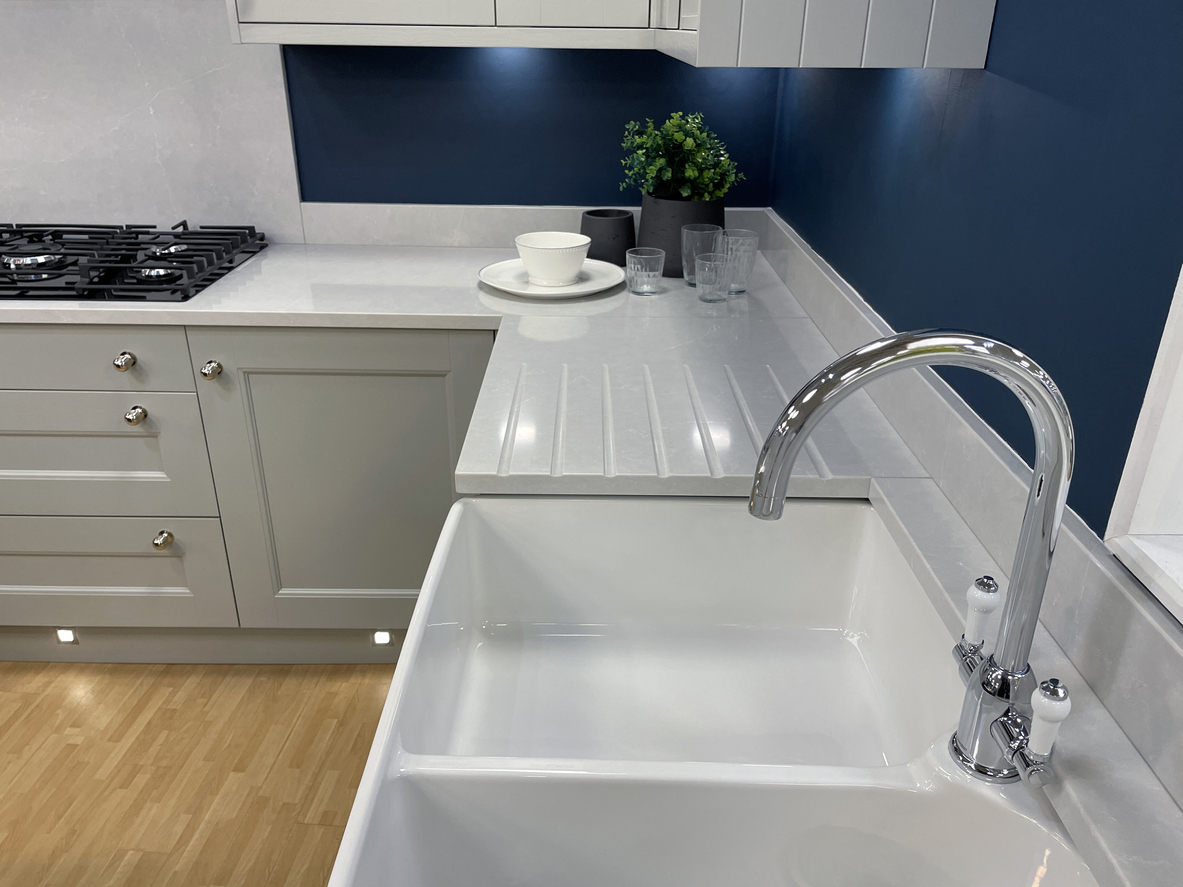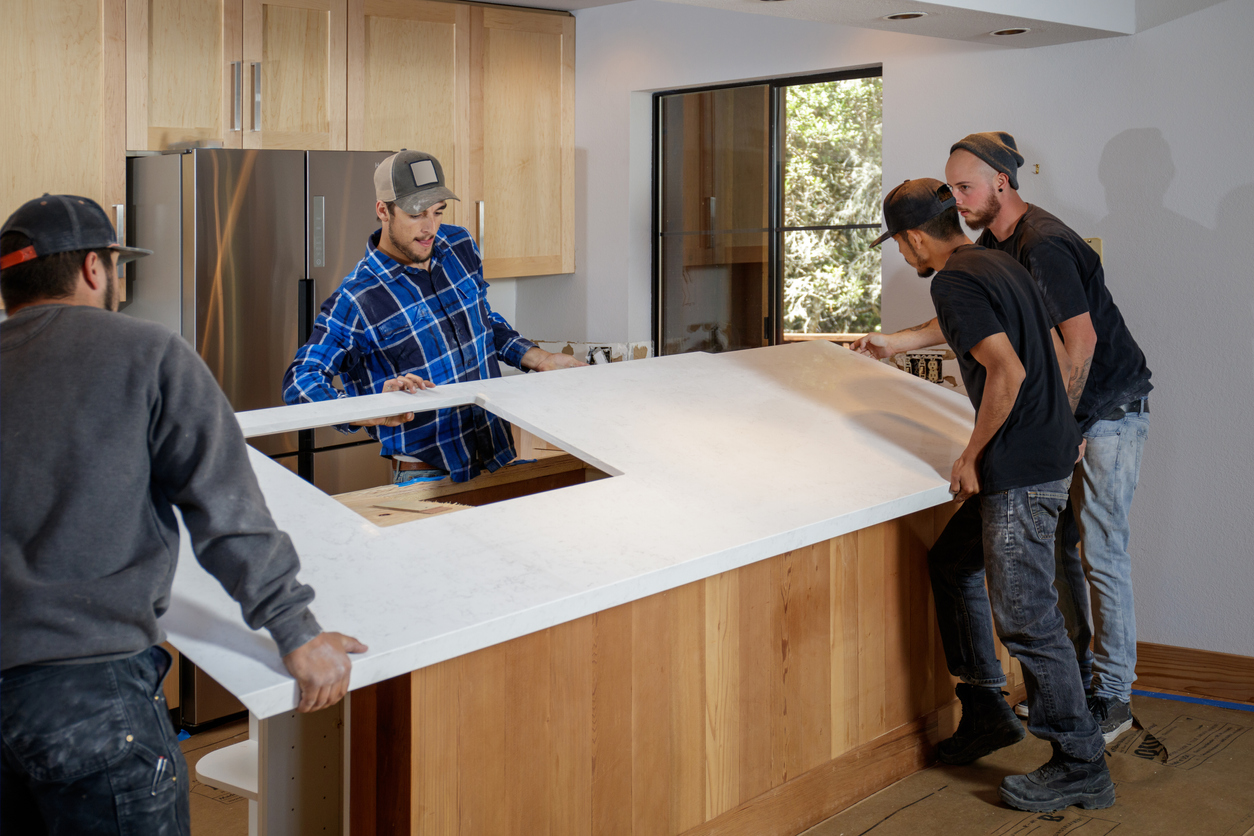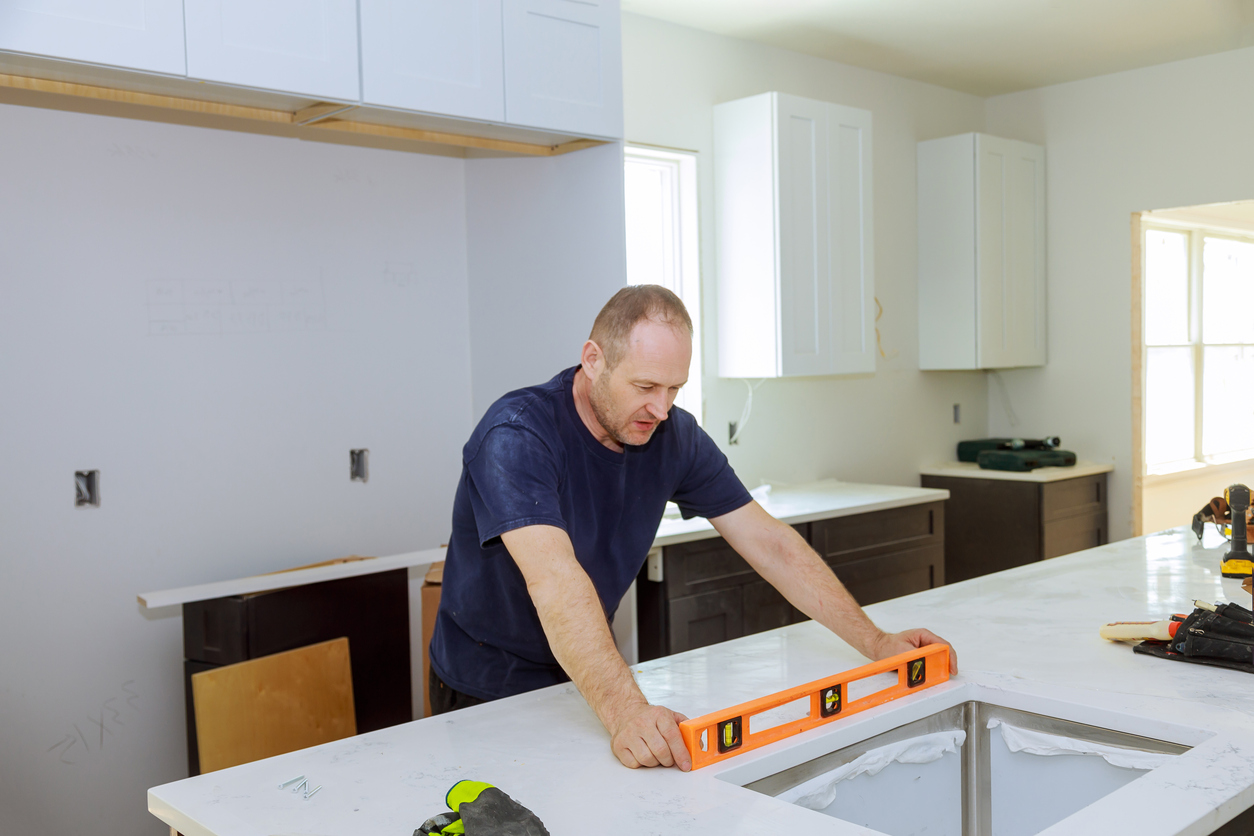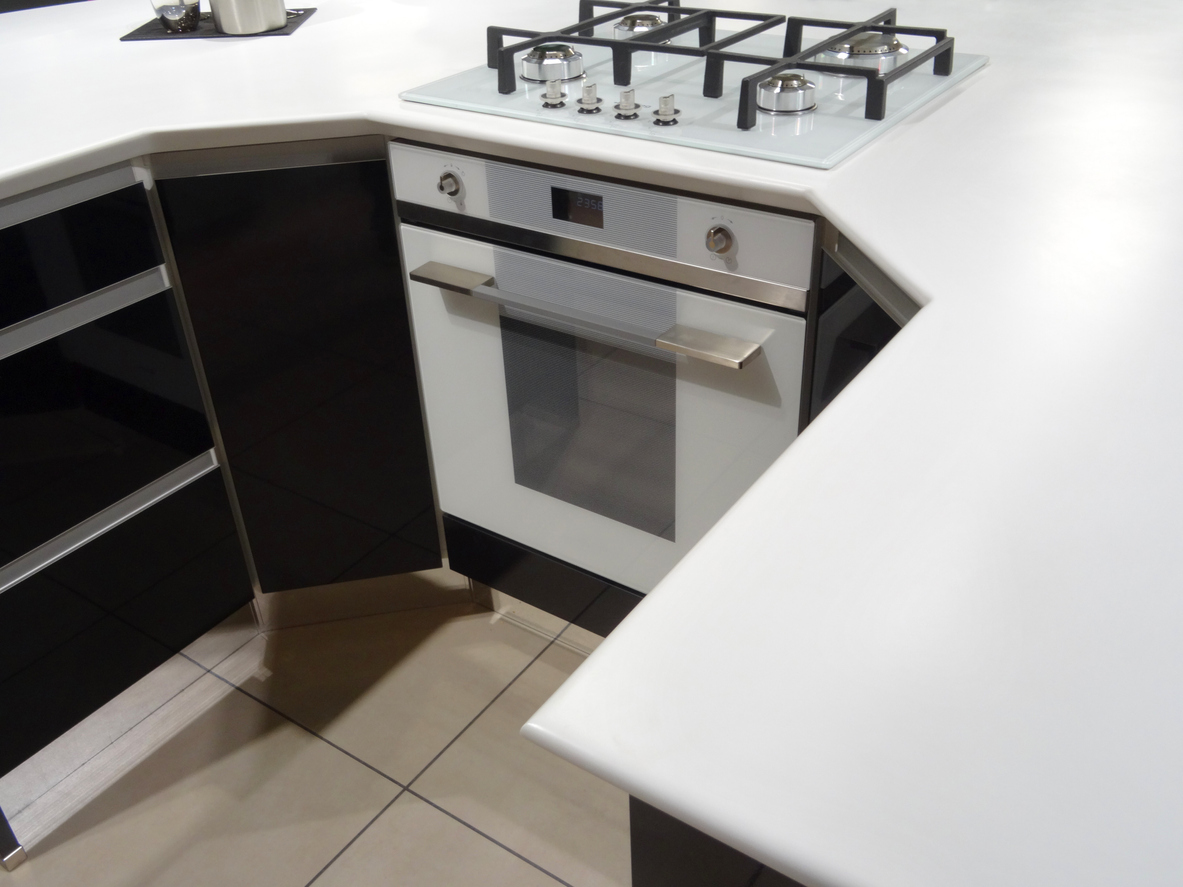

We may earn revenue from the products available on this page and participate in affiliate programs. Learn More ›
- Typical Range: $2,200 to $5,000
- National Average: $3,475
Corian countertops are a popular alternative to granite, quartz, marble, or other solid surface countertops. When compared to the other countertop materials, Corian is durable and relatively inexpensive. Homeowners deciding on a countertop often weigh up the pros and cons of Corian versus quartz and other natural materials. How much are Corian countertops? According to Angi and HomeAdvisor, Corian countertop pricing ranges from $2,200 to $5,000, with the national average at $3,475 for materials and installation. Per square foot, the cost is approximately $40 to $45, but it can go as high as $65 depending on the type, thickness, and design of the material. Labor usually costs around $75 per hour, and the installation of a standard bathroom or kitchen countertop generally takes 6 hours. Keep in mind that labor prices can increase if old countertops need to be removed, if complex cuts in the countertop material are needed, or if backsplashes are added to the design. The final Corian countertop cost depends on the countertop size, thickness, finish, brand, and local labor pricing. What follows are the factors that affect Corian countertop cost, the benefits of Corian countertops, and important questions to ask a countertop installation professional.
What Are Corian Countertops?
Corian solid surface countertops are made from a synthetic substance that was invented by DuPont in 1967 and patented in 1968. The material is a cross between granite and laminate that’s made from alumina trihydrate (ATH) and acrylic polymer. Since the patent expired in 2003, other companies have been allowed to manufacture and sell their own versions of Corian under different brand names. Solid surface countertops are made from a liquid material that’s a blend of resins and minerals that are poured into a mold and hardened. Since the material is pliable and soft during pouring, manufacturing seams can be blended to create a seamless countertop surface. The cost of Corian countertops is generally lower than the cost of granite countertops and other materials like marble and quartz, making it a popular and budget-friendly material. Furthermore, Corian’s nonporous surface can be easily buffed by an industry professional to remove scratches and nicks, and its countertops can be made in different colors and styles to match the decor of any home.

Factors in Calculating Corian Countertops Cost
How much is a Corian countertop? That depends on a few factors. Prices can differ from the national average due to the size, thickness, finish, type of edging, brand, local labor prices, and installation location.
Size and Thickness
Corian countertops price per square foot ranges from $40 to $65 but can reach up to $130 depending on style, color, brand, and finish. Adding a backsplash, decorative edging, or integral sink can increase the price significantly.
Opting for a thicker countertop will also affect the total Corian counter cost. Instead of classifying Corian countertops by grades like other types of countertops, Corian is grouped into thicknesses. This solid surface countertop material comes in three thicknesses: ¼-inch, ½-inch, and ¾-inch. The thicker the material, the stronger and more durable it is, but that also means it’s more expensive.
Finish
Corian countertops have three finishes: matte, semi-gloss, and high-gloss. The majority of Corian countertop styles are available in a matte finish; others have a subtle sheen or high gloss. The countertop finish is tied to the brand, style, and color, so the Corian countertop price is determined more by the type, edging, layout, and material rather than the finish itself. The three available finishes and the material cost per square foot are listed below.
- Matte. Matte Corian countertops cost from $15 to $50 per square foot. The most common finish for Corian, matte is offered by all brands in a wide range of styles and colors. Despite the term matte, the countertop surface isn’t completely flat but instead has a subtle sheen to reflect some light. This finish is available in translucent and various other colors as well as a wide selection of patterns.
- Semi-gloss. A semi-gloss finish also costs from $15 to $50 per square foot. This finish is less common in kitchens; it scratches easily, and the repairs needed to remove the scratches will take off the finish and leave the countertop looking dull. Semi-gloss Corian’s more reflective surface is commonly used for bathroom countertops, since the risk of scratching the surface is less likely in this setting.
- High-gloss. The price for this finish ranges from $15 to $50 per square foot. Corian countertops with a glossy finish have a high shine and are extremely reflective. Scratches and dings are highly visible on this finish, and repairs may make the surface look more marred. Smaller slabs of this material are typically available for bathroom use; it is uncommon in kitchens.
Edging
Solid surface countertops are manufactured just like recycled glass or stone countertops: the material is shaped as a large slab and then finished to fit into a custom space. Corian countertops typically come with eased or square edges at no additional cost, but ordering a different edge will increase the price. Half bullnose, full bullnose, and beveled countertop edging range from $10 to $12 per linear foot; Ogee, Dupont, miter, and quirk edges cost from $20 to $25 per linear foot; and French cove edges will drive the price up to $30 to $35 per linear foot.
Brand
While Corian is a name that has nearly become synonymous with solid surface countertops, many people who search for Corian specifically may be presented with alternative brands. In fact, many manufacturers and brands offer solid surface countertops and have their own way of making the material. Each brand has specific colors, finishes, and styles of Corian countertops, and some materials are easier to custom cut than others. When a homeowner chooses to install Corian countertops, they will typically order the countertop material from a local contractor, who will receive the material from the manufacturer and cut the countertop slabs to fit the size of the kitchen or bathroom space. The following are some popular solid surface countertop brands and their average prices per square foot.
- LivingStone. LivingStone solid surface countertops are available in a variety of styles and colors. While solid colors are available, the company’s countertops can also mimic a quartzlike finish with a speckled surface, without the cost of quartz countertops. This budget-friendly countertop option costs from $19 to $23 per square foot.
- Wilsonart. Wilsonart provides solid surface countertop options that resemble the look of stone with swirls and veins along with the appearance of aggregate pieces in the material. Wilsonart countertops are available in a wide range of styles and colors and cost between $24 and $30 per square foot.
- Corian. Owned by DuPont, Corian is the first company to use this material and has the greatest variety of countertop styles and colors. They can capture the look of natural stone countertops including travertine and marble (but without the cost of marble countertops) and are available in solid and translucent colors. Corian countertops cost from $26 to $50 per square foot.
- Formica. Formica makes many different styles and colors of solid surface countertops, including solid colors and patterns that resemble natural stone. Also available are countertops that feature sparkling additives and colored speckles. Expect to pay between $30 and $35 per square foot for Formica solid surface countertops.
- Avonite. Manufactured by Aristech, Avonite solid surface countertops include options that resemble marble, travertine, and quartz, with intricate veining and other natural features. Made in a wide range of styles and colors, Avonite countertops run from $30 to $48 per square foot.
- Durat. Durat is a sustainable solid surface material that is 100 percent recyclable. It’s made from recycled post-industrial plastics and is available in more than 200 colors. The company offers countertops in solid colors and textures that feature multicolored speckles; these solid surface countertops cost from $30 to $50 per square foot.
Labor
The labor cost to install Corian countertops is approximately $75 per hour, although the price can vary based on the customer’s geographic location. Labor rates are typically more expensive in densely populated urban areas than in more rural locations and can also increase if complex cutting is needed to work around appliances or unusually shaped areas. Selecting more ornate edging, adding a backsplash, or removing old countertops will also increase labor prices.
Installation Location
Corian countertops are suitable for installation in different locations around the home, including the kitchen, bathroom, and outdoor areas. The pricing depends on the size of the countertop that’s needed for the individual space.
- Corian bathroom countertops. Based on a countertop area that ranges from 6 to 12 square feet, the cost of a Corian bathroom countertop runs from $420 to $1,560. The price can differ from this range if the bathroom space is smaller or larger. Solid surface material can be used in various spaces in the bathroom, including benches, shelves, shower walls, and tub decks. Since it’s a nonporous material, Corian works well in bathroom settings.
- Corian kitchen countertops. The cost of installing Corian countertops in a kitchen ranges from $2,100 to $5,200. The average kitchen needs approximately 30 square feet of countertops, although that amount can change for larger kitchens that feature sizable islands. Keep in mind that Corian is prone to scratches, burns, and stains, so care is needed to avoid damaging the countertop surface.
- Corian outdoor kitchen countertops. Many outdoor kitchens require between 12 and 20 square feet of countertop space, but this can differ for smaller or larger outdoor areas. Corian is a popular choice for outdoor kitchen countertops, since it does well in wet and cold environments. The material can soften if exposed to direct sunlight, so it’s best for use only in shaded areas. The average cost for Corian countertops in an outdoor kitchen ranges from $840 to $2,600.
Additional Costs and Considerations
When budgeting for Corian countertops cost, homeowners will benefit from knowing about any additional costs and considerations that can drive up the price of the installation project. These can include old countertop removal, warranties, and additional customizations.

Old Countertop Removal
The average cost to install Corian countertops ranges from $40 to $65 per square foot, and this price can sometimes include the removal of the old countertops. Some countertop installation companies will charge extra for the removal, at an average rate of $20 to $40 per hour and an additional $100 to dispose of the old material. It’s recommended that homeowners double-check with their countertop professional to see if there is an extra charge for removing and disposing of the old countertops.
Warranties
Individual warranties on solid surface countertops vary by manufacturer. DuPont provides a limited 10-year warranty on their Corian countertops, but homeowners may want to check with their chosen brand regarding the specifics of their warranties. Homeowners will typically need to register their purchase with the manufacturer to establish the warranty on the material, and the professional countertop installers should also warrant their installation work. Keep in mind that the manufacturer’s warranty usually covers only defects in the material and not general wear and tear or damage from misuse. The DuPont warranty also does not cover damage from acts of nature, misuse, mishandling, chemical or physical abuse, or excessive heat.
Customizations
Since Corian can be custom shaped and molded to accommodate different areas, it’s an excellent material for integrated backsplashes and sinks. These seamless features create a more cohesive look in a kitchen or bathroom, but they can drive up the installation costs.
- Corian integral backsplash. An integral backsplash connects the countertop with the backsplash with no visible seams. This type of Corian backsplash is typically 4 inches in height and costs between $3 and $5 per linear foot. Integral backsplashes are more commonly seen in bathrooms than in kitchens.
- Corian countertops with an integral sink. An integral sink is made from the same material as the countertop. Instead of being installed as a separate unit from the countertop, the sink is built into the countertop and provides a smooth transition and seamless appearance. Homeowners can choose from oval, round, and rectangular sink bowls for a bathroom and single, double, D-bowls (with a basic D-shape), or bowls with a drainboard attachment for the kitchen. Integral sinks are typically white, but they can be made with the same color and pattern as the countertop; this custom add-on increases the cost by an average of $100 to $300.
- Corian kitchen islands. Using a solid surface countertop for a kitchen island costs from $1,400 to $2,600 based on approximately 20 square feet of countertop space, although this price can fluctuate depending on the size of the island. When considering style options, homeowners will benefit from knowing that a cooktop cannot be undermounted in solid surface countertop material.
Benefits of Installing Corian Countertops
Corian countertops are nonporous and don’t require sealing. This germ-resistant material is highly durable and is a popular alternative to natural countertop materials, such as granite, marble, and quartz.

Simple Repair and Maintenance
Corian countertops are easy to maintain. Solid surface countertops can be cleaned with an ammonia-based cleaning agent, but homeowners will want to avoid using window cleaner, which leaves behind a waxy buildup. Corian can also be cleaned with soap and water; to avoid staining, the countertops are best kept dry after cleaning. Scratches in the surface can be easily buffed out, and chips can be filled in with a repair kit. An additional benefit is that unlike marble, granite, and limestone countertops, Corian countertops do not require sealing.
High Resistance to Germs and Stains
Corian is nonabsorbent and is highly resistant to stains. Since it’s nonporous, bacteria will not be absorbed or grow on the countertop surface.
High Durability
Corian countertops are durable and can easily stand up to everyday wear and tear, but direct heat can damage them. Heat pads and trivets provide an effective source of protection.
Flexible Design
Available in a wide array of colors and textures, Corian countertops can be custom made to fit in with any choice in aesthetics. Corian’s seamless design allows a solid surface countertop to incorporate integral backsplashes and sinks, complex edging, or waterfall patterns.
Corian Countertops Installation: DIY vs. Hiring a Professional
It may be tempting for homeowners to attempt to install Corian countertops on their own to save money, but the project requires specialized tools. Hiring a countertop installation professional will guarantee the installation is done quickly and correctly. While homeowners who have experience with countertop installation may own the required tools and equipment to install Corian countertops skillfully, the average homeowner is not apt to have them on hand.

Another reason to go with a professional for Corian countertop installation is to preserve the manufacturer’s warranty. Since DuPont’s Corian countertop warranty doesn’t cover mishandling, a novice homeowner installing their own countertop might accidentally damage the material and inadvertently void the warranty. The best countertop installers also tend to guarantee their work, so if they make any mistakes while installing the countertop, they make repairs on their own dime. On the other hand, if the homeowner makes a mistake during a DIY installation, they may need to purchase new countertops, which could end up costing them more than if they had just paid a professional for installation in the first place.
How to Save Money on Corian Countertops Cost
Purchasing Corian countertops can be expensive, and that’s before any additional costs associated with the installation project are tacked on. Opting for the cheapest type of Corian countertop is one way to save money, but there are other ways to save without compromising on quality.
- Get multiple quotes. Homeowners can benefit from getting at least three quotes from reputable countertop installation companies in their area.
- Be flexible. Contractors may offer homeowners discounts for installation projects scheduled during the company’s slow time.
- Opt for a simple edge. Complex countertop edging can be expensive. Sticking with simpler edges that are included in the price can decrease the overall Corian countertops cost.
- Stay thin. Because thicker slabs of Corian countertop material are more expensive, some homeowners choose a thinner slab to save money on installation costs.
- Do some of the prep work on your own. If the contractor charges extra to remove and haul away the old countertop, homeowners may consider tearing it out and removing it on their own to save some labor costs.
Questions to Ask About Corian Countertops Installation
Asking a countertop professional the right questions can help minimize miscommunication and get the results the homeowner wants. The following questions about Corian countertop installation can help homeowners decide on the right professional.
- How long have you been in business?
- Will you provide references?
- Are you insured?
- Are you licensed?
- Do you offer free estimates?
- Can I see examples of your previous installations?
- What kinds of countertops do you install?
- How much do Corian countertops cost?
- How long will the installation take?
- Who will install the countertops?
- What type of warranty do you offer?
- How should I maintain Corian countertops?
- How can I leave a review?
FAQs
Before a homeowner decides on Corian countertops, it’s helpful to have all the important information regarding Corian countertop installation and the associated costs. The following frequently asked questions about Corian countertops can help guide homeowners in their decision-making process.

Q. Can I install Corian countertops myself?
While it is possible to install Corian countertops on your own, it’s not recommended as a DIY project.
Q. What are the pros and cons of Corian countertops?
Corian countertops are easy to maintain and clean, durable, and water- and stain-resistant. Compared to natural stone materials, however, such as quartz and granite, Corian is prone to heat damage.
Q. Do Corian countertops scratch easily?
Since Corian is softer than granite and quartz, it can scratch easily. It’s recommended that homeowners always use a cutting board and never cut directly on the countertop to avoid scratches. Fine sandpaper or a green scrub pad is an effective buffing tool.
Q. How long do Corian countertops last?
Corian countertops can last 30 or more years, depending on maintenance and care.
Q. How do I install Corian countertops?
To install Corian countertops, it’s important to have experience. First, the kitchen or bathroom space needs to be sketched out, including the location of fixtures and appliances. Next, the existing countertops and openings of the doors need to be measured accurately to ensure the correct countertop size and to make certain the doors, when opened, will not hit the new countertops. Many home improvement stores carry Corian countertops, or they can be ordered from a local contractor. Homeowners will need to have the correct tools and equipment to install the countertops safely and accurately themselves. If the installation process seems overwhelming, a countertop installation professional can install the Corian quickly and correctly.
Q. Is Silestone the same as Corian?
Silestone and Corian are two different materials. Silestone is engineered stone made from quartz, while Corian is a solid surface material made from resin and minerals.
Sources: Angi, HomeAdvisor, Fixr
